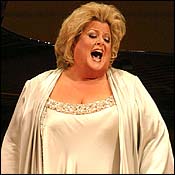
Not since Kathleen Battle got herself fired from the Metropolitan in 1994 for “unprofessional actions” has an opera diva crossed over into the popular media in such a big way—and with such flair. When word leaked out that Covent Garden had canceled Deborah Voigt’s contract to sing the title role in Strauss’s Ariadne auf Naxos because she was too large for the production’s apparently indispensable “little black cocktail dress,” angry cries of “Discrimination!” filled the air, and the soprano’s sad tale suddenly started popping up everywhere—in the papers, magazines, even on morning TV.
The news was in fact old by the time the press got hold of it, but that didn’t seem to matter. “The timing of this couldn’t be much better,” Voigt delightedly told an interviewer as she basked in all the attention. “You can’t really buy this kind of publicity.” Indeed, you can’t. Voigt’s widely anticipated first Isolde in Vienna last spring, her continued prominence as a Met star and favored prima donna, her first solo album for EMI, her pop turn in December at the New York Theatre Workshop in Debbie’s Gotta Let Go!—all this never got her much special notice beyond the arts pages and opera chat rooms until Covent Garden made its fattist statement. Now the soprano is red-hot, and, needless to say, her recent Carnegie Hall debut recital with Brian Zeger at the piano was very well attended.
The fans went wild, of course, but the concert itself seemed something of an anticlimax. Voigt is not the first opera singer to be baffled by the traditional song-recital format, nor the first to appear truly comfortable only at the end, when the encores are in sight. The opening Schubert group was not much more than phoned in by a voice that sounded uncharacteristically thin and unfocused, while the Strauss and Tchaikovsky songs also came across as distant and impersonal despite the more settled vocal delivery. The picture brightened considerably during the second half, when Voigt could communicate in English with songs by Charles Ives, Ben Moore, William Bolcom, and Stephen Sondheim. Then came the encores, and Debbie finally let go, especially in a novelty number by Moore about a big Wagnerian soprano and a little black cocktail dress. More to the point, a fearless delivery of Brünnhilde’s battle cry indicates a role that is surely in Voigt’s future, and Kern’s “Can’t Help Lovin’ Dat Man” couldn’t have been more moving or expressive. The enjoyable last twenty minutes or so of this recital showed that Voigt, when fully warmed up, can not only deliver the vocal goods but also be an engaging singer at ease with herself and her audience in the right material.
“Voigt is not the first opera singer to be baffled by the traditional song-recital format.”
Perhaps she should stick with a cabaret format if recitals are to remain a career priority for her. If she expects to continue exploring the classic song literature, though, there’s a lot of coaching yet to be done—I can only imagine the devastating comments from Elisabeth Schwarzkopf if that perfectionist ever encountered Voigt in a master class.
No persuasive fashion statements were made, either—a queer eye for the straight diva might be in order here. Voigt may be a large woman, but she presents a far lovelier picture onstage than one would guess from this concert, with that unbecoming helmet hairdo and so much heavy feathered drapery.
To end on a more positive note, Voigt’s new EMI disc is an impressive achievement, generous selections from her Wagner and Strauss repertory recorded on a very good day. Don’t expect any compelling interpretive revelations, but the sound is gorgeous as she pours out streams of round, perfectly positioned tone. The disc has a ridiculous title, Obsessions, no doubt a crude marketing ploy. Or maybe that’s also an oblique reference to a soprano and a little black cocktail dress.